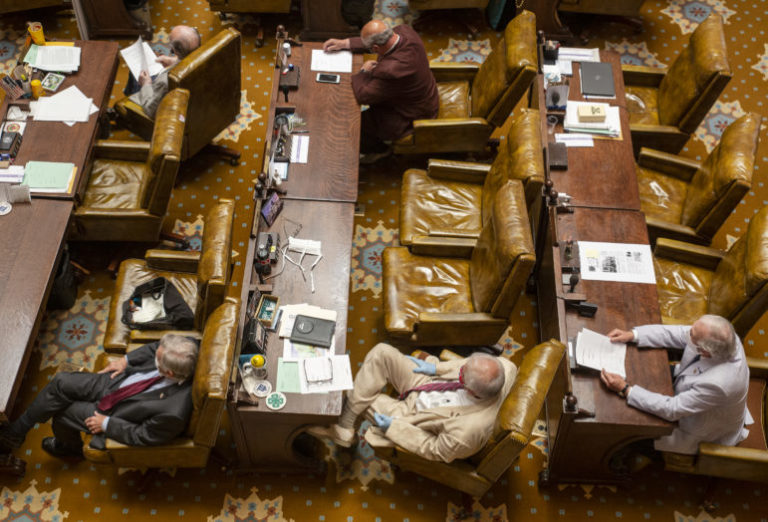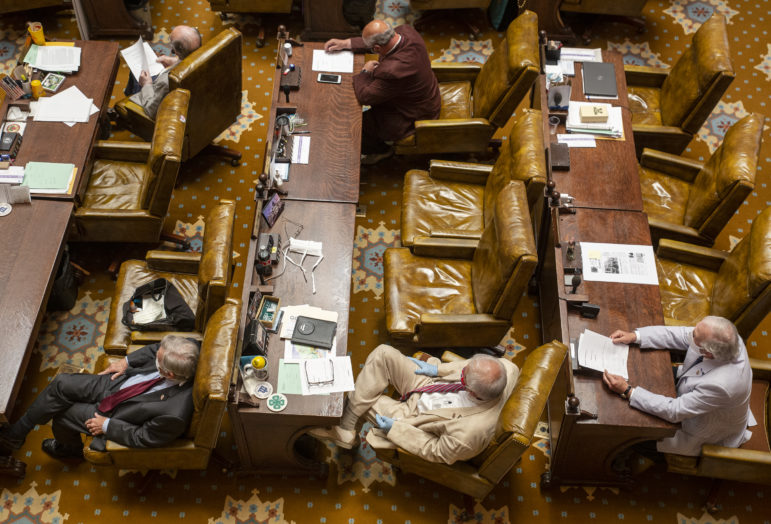

Eric J. Shelton/Mississippi Today
State representatives prepare to make decision on Gov. Tate Reeves spending authority over federal coronavirus stimulus money, at the statehouse in Jackson, Miss., Friday, May 1, 2020.
The 2019 Legislature appropriated $8.6 billion in federal funds to various agencies of state government. These were funds passed by the United States Congress, signed into law by the president and sent to Mississippi for various programs, ranging from money for Medicaid beneficiaries to funds for highway construction and maintenance to funds for pandemics like COVID-19.
The total state budget, including those federal funds, is $19.23 billion.
The reason that the Legislature appropriates the federal funds – funds that already have been appropriated by Congress – is that generally speaking the executive agencies would not have the authority to spend the funds without action of the Mississippi Legislature.
An additional $1.25 billion in federal funds directed to Mississippi to help pay for the cost of fighting the deadly COVID-19 pandemic are at the heart of a heated debate between Gov. Tate Reeves and the Legislature. The Legislature, which recessed on March 18 for safety concerns related to the coronavirus, will return to the Capitol Thursday to take up legislation to use a portion of those funds to provide help for small businesses and to perhaps deal with a gubernatorial veto of the bill preventing Reeves from spending the funds.
To grasp the issues surrounding the federal funds it might help to understand what can be a sometimes confusing and sometimes contradictory state budgeting process.
Mississippi Supreme Court cases going back as far as at least 1905 give the Legislature the power of the purse – the authority to appropriate.
The 1905 case – Colbert vs. State – identifies the power to appropriate as the Legislature’s “supreme” power.
Each year the Legislature passes more than 100 budget bills to fund the various agencies that make up state government. Each bill provides how much money the agency has for the upcoming fiscal year to operate. And the bills provide the sources of that money. State tax collections and federal funds are the primary sources of revenue for state agencies.
Most of the appropriations bills – at least for the larger agencies – also give the agency the authority to spend any unanticipated federal funds it might receive if it gets those funds when the Legislature is out of session. It is called “escalating authority” to spend federal funds that were not appropriated by the Legislature.
That escalating authority allows agencies to spend federal funds sent to help the state deal with emergencies, such as tornadoes, hurricanes or even a pandemic. The escalating authority also can be used to allow an agency to spend federal funds that Congress might provide that were not anticipated by the Legislature.
In a nutshell the current fight between the governor and Legislature boils down to the fact that the Legislature believes $1.25 billion is too much escalating authority for the governor to have. They want a say in how the money is spent.
It is important to note that the bill recently passed by the Legislature leaves the governor $100 million for the current fiscal year, which ends June 30, to spend to address COVID-19 issues. And presumably, the Legislature also would place some of the $1.25 billion at the governor’s discretion for the new fiscal year, beginning July 1.
In addition, other federal funds related to the Coronavirus – close to another $1 billion — have gone to multiple agencies, such as the Emergency Management, the Department of Health, the governor and education entities to deal with the pandemic. Those funds are being spent through the agencies’ escalating authority – granted by the Legislature – with no interference from the Legislature.
In a commentary in support of Reeves’ position, former Gov. Haley Barbour, who was able to expend federal Hurricane Katrina funds without legislative interference, pointed to a state law that he said clearly gave him and would give Reeves the authority to spend the funds. The law, 27-104-21, which authorizes the escalating authority, goes on to say the funds can be spent “unless otherwise specified in the appropriation bill, the executive director of the Department of Finance and Administration shall have the authority to approve escalations in a budget using one hundred percent (100%) federal money.”
Reeves believes he can more efficiently spend the funds to address needs as they become available. He says the Legislature, which often is burdensome, cannot respond as quickly as he can.
Reeves has at times lashed out at the Legislature saying in a worst case scenario their actions could result in people dying.
“This is power politics at its worse,” he said recently.
Legislators believe they are just doing their constitutional duty to appropriate state funds.
At any rate, legislators will be in session at least Thursday and Friday and will presumably take up a Reeves veto should one occur. Or another possibility in the often-complex legislative rules is a senator might try to make a motion to reconsider. If Lt. Gov. Delbert Hosemann recognizes that motion, it would have to be tabled and in essence the bill would have to be voted on again by the full Senate. If it was then approved by the Senate, it would go back to Reeves giving him an additional five days to veto it.
The bill to prevent the Republican Reeves from spending the money passed the Republican-contolled Legislature last week with no dissenting votes in the 122-member House and two no votes in the 52-member Senate.
It takes a two-thirds majority in both chambers to override a veto.
A bipartisan group of north Mississippi senators sent out a statement Wednesday, saying “Each of us wants to work with the governor for the next four years. We simply don’t think it’s right for any one individual to have complete control over $1.25 billion.”
The post Reeves, legislative showdown: Federal funds always part of state budget appeared first on Mississippi Today.
- ‘You’re not going to be able to do that anymore’: Jackson police chief visits food kitchen to discuss new public sleeping, panhandling laws - July 4, 2025
- Artists ‘call home’ in 2025 Mississippi Invitational through works on environment, ancestry, society and more - July 4, 2025
- Advocate: Birthright citizenship assault leaves Mississippi children living in fear - July 4, 2025